To write the perfect remote job cover letter, start by grasping the job description and incorporating keywords that mirror employer priorities. Personalize your greeting to establish a direct connection. Highlight skills pertinent to the role and exhibit your remote work experience, emphasizing collaboration and effective communication. Use clear, succinct language and include specific examples that illustrate your accomplishments. Don't forget to reflect your enthusiasm for the position and the company's mission. Finally, proofread meticulously to double-check no errors slip through. There's so much more you can learn to make your cover letter shine!
Key Takeaways
- Personalize your cover letter by addressing it to a specific individual to show genuine interest in the position.
- Highlight relevant skills and experiences that align with the job description to demonstrate your suitability for the role.
- Showcase your remote work experience by detailing examples of successful collaboration and productivity in virtual settings.
- Emphasize your communication abilities, illustrating your versatility with digital platforms and your enthusiasm for open dialogue.
- Proofread thoroughly to ensure clarity, consistency, and professionalism, making a strong positive impression.
Understand the Job Description
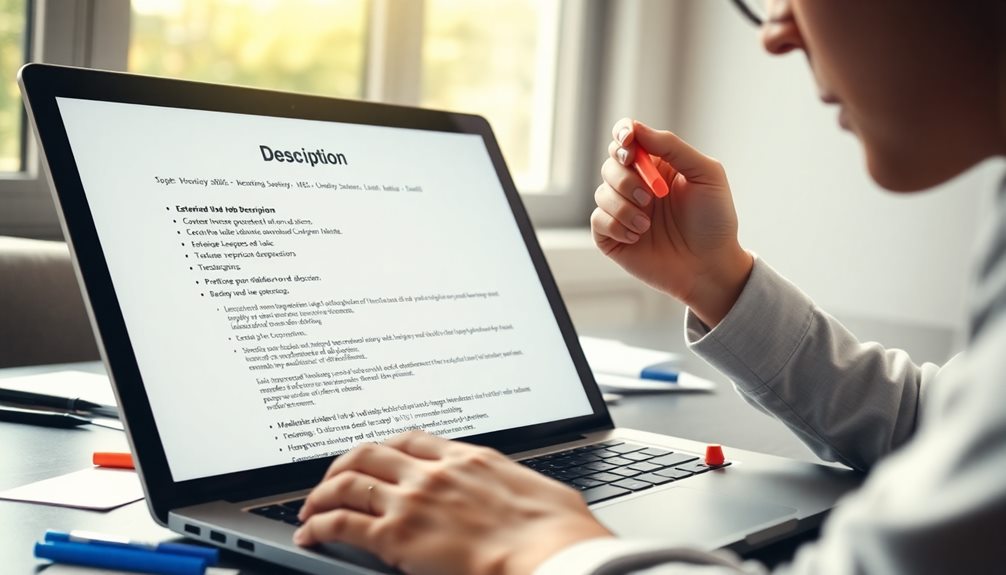
When you immerse yourself in a job description, it's like unwrapping a gift filled with clues about what the employer truly values. Each line reveals important insights, so take the time to read it carefully. You'll find keywords that hint at the skills and experiences they prioritize. By identifying these keywords, you can tailor your cover letter to resonate with the employer's needs, making your application stand out.
Additionally, consider how joining a community like the Virtual Career Compass can provide you with exclusive resources and personalized support to enhance your job application process, including access to advanced interview preparation training courses.
Showing understanding of the job description goes beyond simply repeating what you read. It's about demonstrating that you've connected the dots between your experiences and the requirements of the role. Start by highlighting your relevant achievements and aligning them with the specific responsibilities outlined. This approach not only displays your qualifications but also shows that you genuinely care about the position.
Don't hesitate to incorporate the company's values or mission into your letter. If their focus is on teamwork, for instance, share an example of how you've excelled in collaborative environments. This personal touch establishes a deeper connection and signals your commitment to fitting in with their culture.
Personalize Your Greeting
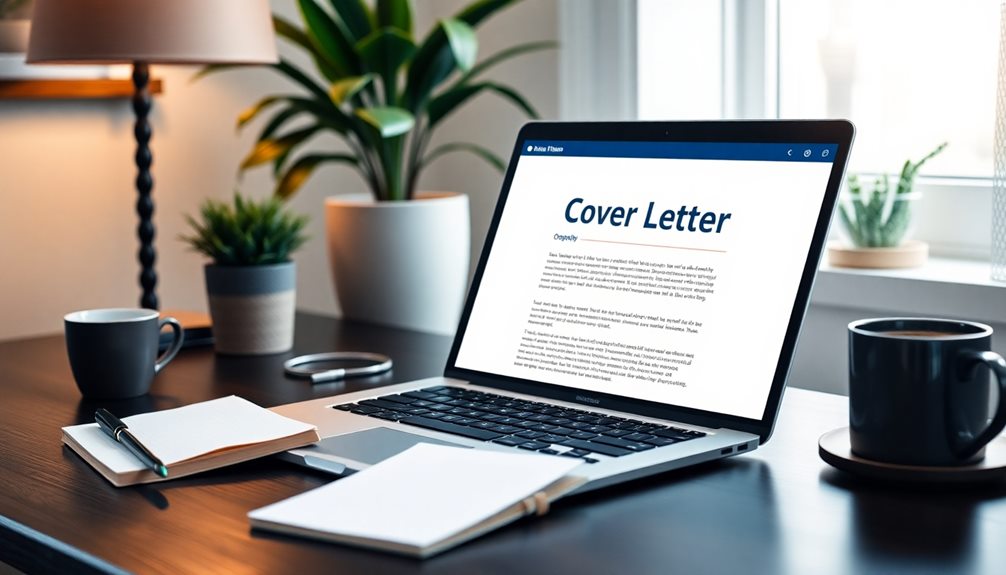
Addressing your cover letter to a specific individual can make a significant difference in how it's received. It shows that you've done your homework and care enough to make a personal connection. Start by researching the company's website or LinkedIn profiles to find the hiring manager's name. If you can't find it, a simple call to the company can often yield the information you need.
Greeting etiquette in a cover letter is vital. Instead of a generic "To Whom It May Concern," opt for "Dear [Hiring Manager’s Name]." This small adjustment not only grabs attention but also conveys that you're genuinely interested in the role and the team you hope to join. It sets a positive tone right from the start.
Remember, a personal connection can set you apart in a sea of applications. By addressing your cover letter directly, you're showing respect for the reader and their time. It humanizes your application, making it relatable and inviting. You're not just another name in the pile; you're a potential team member who values connection.
In your greeting, keep it warm yet professional. A simple "Hi [Name]" might suffice in less formal environments, but make sure you maintain professionalism. Personalizing your greeting isn't just about following etiquette; it's about creating an immediate bond that resonates. So take that extra step; it'll do wonders for your cover letter's impact.
Highlight Relevant Skills
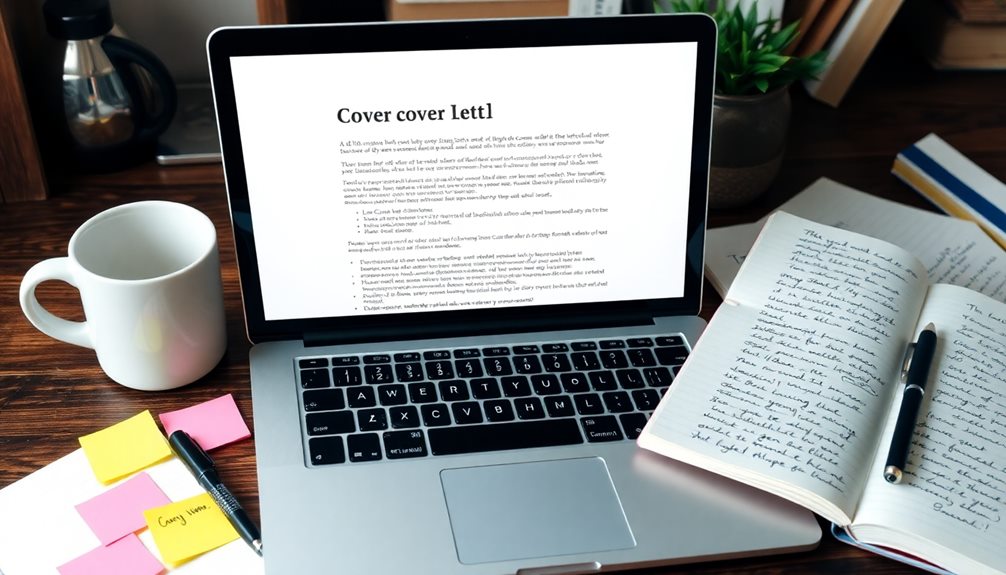
To make your cover letter stand out, focus on highlighting the skills that align directly with the job description. This isn't just about listing what you can do; it's about showcasing your skill demonstration in a way that resonates with the employer's needs.
Take a close look at the job posting and identify the key skills mentioned. Then, reflect on your own experiences and pinpoint where you've successfully applied these skills in past roles.
When you write about these relevant skills, connect them to industry relevance. Use specific examples that illustrate how your expertise can benefit the company.
For instance, if the job requires strong communication skills, share a brief story about a time when you effectively conveyed a complex idea to a diverse audience. This not only proves your capability but also shows that you understand the importance of clear communication in a remote setting.
Showcase Remote Work Experience
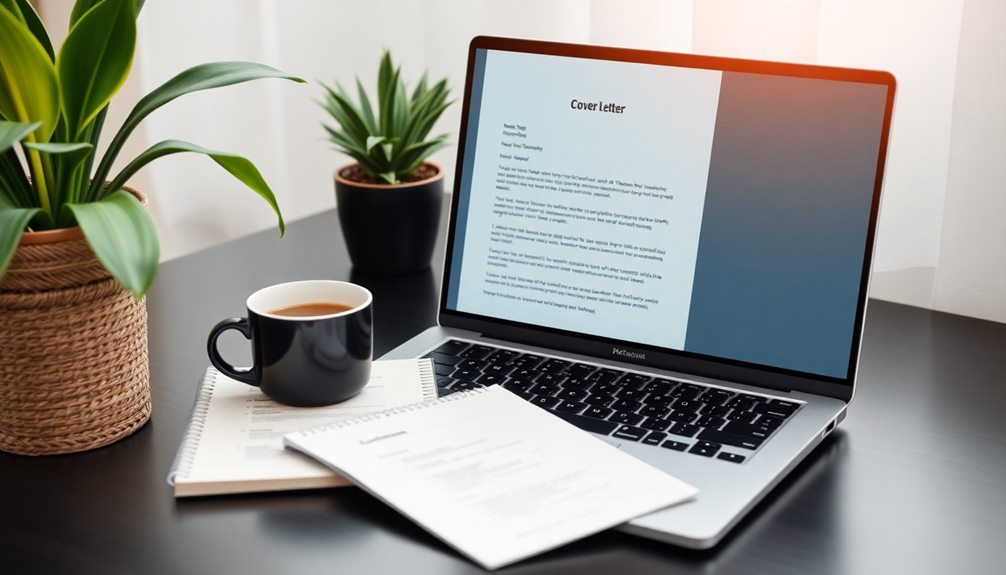
Having successfully navigated remote work environments, you've likely developed skills that are invaluable in today's job market. When you showcase your remote work experience in your cover letter, you not only highlight your adaptability but also demonstrate your ability to thrive in a virtual landscape. Employers want to know that you can effectively contribute to their remote teams.
Start by detailing specific instances where you excelled in remote collaboration. Did you lead a project with team members from different time zones? Share how you coordinated schedules, utilized collaborative tools, and brought everyone together to achieve a common goal. This illustrates your proactive approach and commitment to fostering teamwork, even from a distance.
Next, emphasize your virtual productivity. Highlight any tools or software you've mastered that enhance efficiency, such as project management applications or communication platforms. Include metrics or outcomes to show how your efforts led to successful project completions or improved workflows. This not only underscores your capability but also reassures potential employers that you can hit the ground running.
Emphasize Communication Abilities

Effective communication is the backbone of successful remote work. When you're crafting your cover letter, make sure to highlight your communication abilities prominently. In a remote environment, clarity and responsiveness are essential. You want to show potential employers that you can foster strong connections through virtual teamwork, ensuring everyone's on the same page, even from miles away.
Start by sharing specific examples of how you excel in remote collaboration. Maybe you led a project where you coordinated tasks across different time zones, or perhaps you facilitated productive meetings using video conferencing tools. Whatever the case, illustrate how your communication style contributed to the team's success.
Employers value candidates who can articulate ideas clearly and adapt their communication to suit different audiences. Mention your proficiency in using various digital platforms—whether it's Slack for quick chats or Zoom for in-depth discussions. This highlights your versatility and readiness to engage with diverse teams.
Don't forget to express your enthusiasm for open dialogue. Highlight your belief in providing constructive feedback and actively seeking it from others. This underscores your commitment to continuous improvement and collaboration.
Ultimately, your goal is to convey that you're not just a skilled worker, but also a teammate who thrives in a remote setting. By emphasizing your communication abilities, you'll show that you can build rapport and contribute positively to a cohesive, remote work culture.
Demonstrate Cultural Fit

Finding the right cultural fit is crucial when applying for remote jobs, and it's something you can showcase effectively in your cover letter. Employers want to see that you understand their values and how you'll contribute to their team. By demonstrating your alignment with their culture, you can highlight your potential for team collaboration and emphasize your dedication to maintaining a healthy work-life balance.
Here are some key points to keep in mind when crafting your cover letter:
- Research the Company: Familiarize yourself with their mission statement and core values. This shows you're genuinely interested and committed.
- Share Personal Experiences: Mention instances where you've excelled in a collaborative environment or managed to balance work and personal life effectively.
- Use Their Language: Incorporate terminology from their job description or website. This creates a sense of connection and shows that you're on the same page.
- Express Enthusiasm for Team Dynamics: Highlight your excitement about contributing to a positive team culture and supporting colleagues, even from a distance.
Use Clear and Concise Language
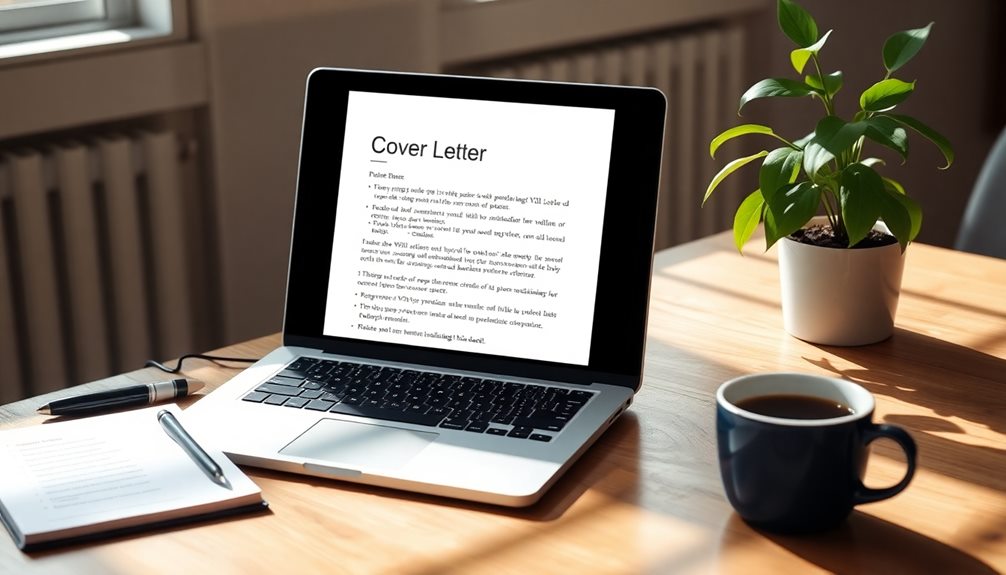
Your cover letter's clarity can make all the difference in grabbing an employer's attention. When you're applying for a remote job, clear and concise language helps you communicate effectively, showing that you value the reader's time. Start by keeping your sentences short and to the point. This not only makes your letter easier to read but also guarantees your key messages shine through.
Consider using formatting tips to enhance clarity. Break up large chunks of text with bullet points or short paragraphs. This creates white space that invites the reader in and allows them to quickly scan your qualifications. Remember, a well-structured cover letter reflects your organizational skills—an essential trait for remote work.
Adjusting your tone is equally important. Aim for a friendly yet professional vibe. You want to connect with the employer, showing that you're not just another candidate but someone who genuinely fits their team culture. Use active voice to keep your writing dynamic and engaging.
Instead of saying "I have experience," say "I excel in remote collaboration." This subtle shift not only sounds more confident but also emphasizes your proactive nature.
Lastly, avoid jargon and overly complex language. Your goal is to communicate, not to confuse. A straightforward approach makes it easier for employers to see your strengths and understand why you'd be a great addition to their remote team. By focusing on clarity and conciseness, you'll present yourself as a strong candidate who's ready to contribute.
Include Specific Examples
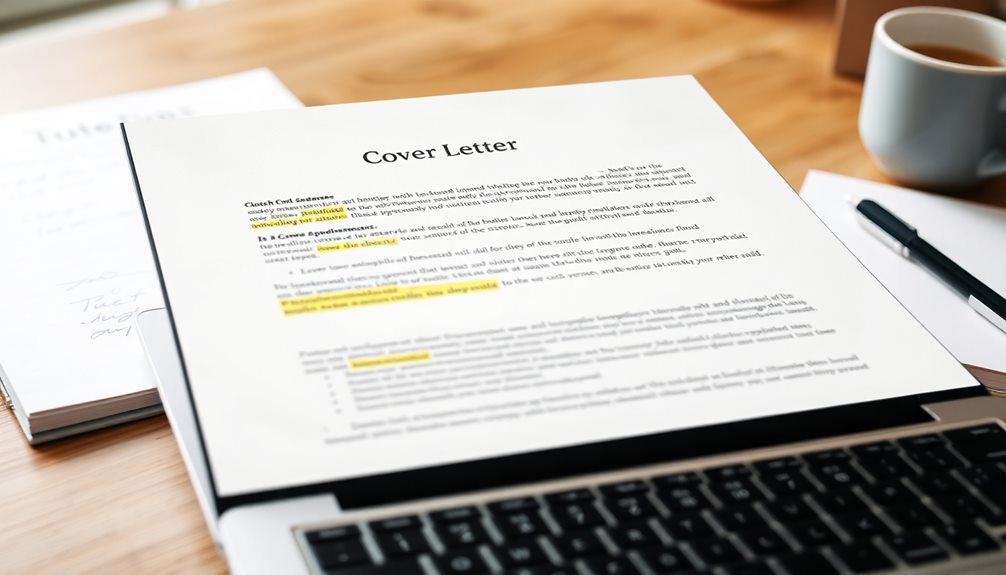
Employers want to see not just what you can do, but how you've done it in the past. Including specific examples in your cover letter allows you to showcase your skills effectively. Think of it as an opportunity for creative storytelling—where your experiences become the narrative that makes you stand out. Use storytelling techniques to paint a vivid picture of your achievements, making it relatable and engaging.
Here's how to include those examples strategically:
- Highlight Relevant Projects: Discuss a specific project that relates to the job you're applying for. Explain your role and the outcome.
- Showcase Problem-Solving Skills: Share an instance where you overcame a challenge. Detail your approach and the positive results.
- Quantify Achievements: Whenever possible, use numbers to illustrate your impact. Did you increase sales by 20%? Mention it!
- Demonstrate Collaboration: If you worked in a team, describe your contributions. This shows you can thrive in a remote environment.
Reflect Enthusiasm and Passion

Crafting a cover letter that reflects your enthusiasm and passion can truly set you apart from other candidates. When you express genuine excitement about the role and the company, it resonates with hiring managers. They want to see that you're not just looking for any job, but that you're excited to contribute to their mission and culture.
Start by sharing what specifically excites you about remote work. Maybe it's the flexibility it offers or how it allows for a better work-life balance. You could mention how remote work has enabled you to connect with diverse teams, enriching your professional experience. This not only showcases your passion but also highlights your understanding of remote work benefits.
Next, infuse your cover letter with your passion for the industry. Discuss why you're drawn to this particular field and how your experiences align with the company's values. Use vivid language to convey your excitement; instead of saying you're "interested" in the company, say you're "enthused" at the prospect of joining their innovative team.
Proofread and Edit Carefully

After you've poured your heart into expressing enthusiasm for the position, it's time to polish your cover letter to perfection. Don't underestimate the power of proofreading and editing; this step can be the distinction between landing an interview or being overlooked.
Here are a few strategic tips to guide you:
- Grammar check: Always run a grammar check tool to catch any mistakes that might slip through your fingers. Even a tiny error can create a negative impression.
- Read it aloud: Hearing your words can help you spot awkward phrasing or unclear points. You want your cover letter to flow naturally.
- Formatting tips: Guarantee your cover letter follows a clean format. Use consistent fonts, sizes, and spacing to make it visually appealing.
- Get a second pair of eyes: Sometimes, we miss our own mistakes. Having a friend or mentor review your letter can offer valuable feedback.
Frequently Asked Questions
What Should I Include in the Subject Line of My Cover Letter?
When crafting your subject line, think about email etiquette and how to grab attention right away.
You might want to include the job title and your name, like "Application for [Job Title] – [Your Name]."
This not only keeps it professional but also makes it easy for the recipient to find your email later.
An engaging subject line shows you're serious about the opportunity and ready to make a strong impression!
How Long Should My Cover Letter Be for a Remote Job?
When crafting your cover letter, think of it as a warm handshake; you want to make a strong impression right away. For remote job applications, aim for a length of about 300 to 400 words. This allows you to succinctly convey your skills and passion without overwhelming the reader.
Should I Mention Salary Expectations in My Cover Letter?
When it comes to mentioning salary expectations in your cover letter, it's usually best to hold off. Instead, focus on showcasing your skills and experiences that make you a great fit for the role.
Can I Use a Template for My Remote Job Cover Letter?
Using a template for your remote job cover letter can feel like a double-edged sword. On one hand, it gives you a solid structure to follow; on the other, it risks sounding generic.
You'll want to customize the template to reflect your unique voice and experiences. By blending the template with personal touches, you create a compelling cover letter that stands out, making employers feel that you truly belong in their team.
How Do I Address Gaps in My Employment History in My Cover Letter?
When addressing gaps in your employment history, it's essential to be open and honest. Handling unemployment gaps isn't easy, but you can frame them positively. Explain your career breaks by highlighting skills you gained or experiences that enriched you during that time. Share how those moments have prepared you for this role.
Conclusion
Crafting the perfect cover letter for a remote job is like assembling a puzzle—you need the right pieces in place to create a complete picture. By understanding the job description, personalizing your approach, and showcasing your skills, you'll stand out in a sea of applicants. Remember, it's not just about what you've done, but how you communicate your passion and experience. Take the time to refine your letter, and you'll set yourself up for success in your job search.
